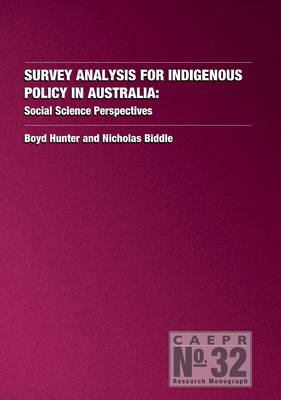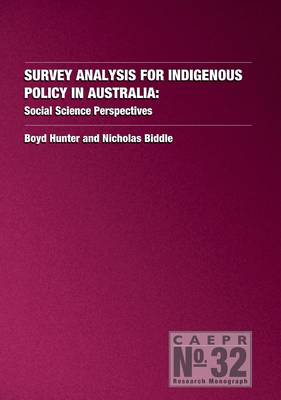
- Afhalen na 1 uur in een winkel met voorraad
- Gratis thuislevering in België vanaf € 30
- Ruim aanbod met 7 miljoen producten
- Afhalen na 1 uur in een winkel met voorraad
- Gratis thuislevering in België vanaf € 30
- Ruim aanbod met 7 miljoen producten
Zoeken
Survey Analysis for Indigenous Policy in Australia
Social Science Perspectives
€ 51,45
+ 102 punten
Omschrijving
Indigenous policy is a complex domain motivated by a range of social, cultural, political and economic issues. The Council of Australian Governments 'closing the gaps' agenda for addressing Indigenous disadvantage in Australia now includes six targets with well defined and measurable outcomes for policy action. In this context there is a continuing and pressing need for robust debate to understand how meaningful improvement in Indigenous outcomes might be achieved. This monograph presents the peer-reviewed proceedings of the 2011 CAEPR/ABS conference on 'Social Science Perspectives on the 2008 National and Aboriginal Torres Strait Islander Social Survey'. It is the fourth CAEPR monograph since 1992 to reflect on national surveys of Indigenous Australians. The conference covered topics including child development, crime and justice, culture, wellbeing, the customary economy, demography, education, employment, fertility, health, housing, income and financial stress, mobility, poverty, social exclusion, and substance abuse. The papers summarise the strengths and limitations of the 2008 NATSISS, discuss the types of policy-relevant questions it can inform, and consider future survey design. A social survey such as the NATSISS can ultimately never tell those responsible for developing public policy what to do, but it can provide useful information to inform policy decisions. This volume will be useful for researchers and policy makers, and relevant to the wider national debate and, in particular, Indigenous communities and organisations.
Specificaties
Betrokkenen
- Uitgeverij:
Inhoud
- Aantal bladzijden:
- 346
- Taal:
- Engels
- Reeks:
- Reeksnummer:
- nr. 32
Eigenschappen
- Productcode (EAN):
- 9781922144188
- Verschijningsdatum:
- 1/11/2012
- Uitvoering:
- Paperback
- Formaat:
- Trade paperback (VS)
- Afmetingen:
- 176 mm x 250 mm
- Gewicht:
- 784 g

Alleen bij Standaard Boekhandel
+ 102 punten op je klantenkaart van Standaard Boekhandel
Beoordelingen
We publiceren alleen reviews die voldoen aan de voorwaarden voor reviews. Bekijk onze voorwaarden voor reviews.










